

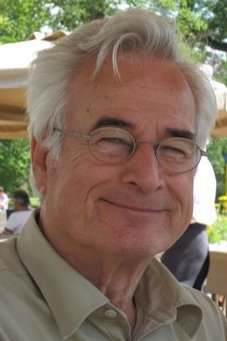
John Willemsens (Buddhist name: Advayavadananda) is a co-founder and the current chairman of the Advayavada Foundation and the director of its mouthpiece, the Advayavada Buddhism Information Center. He was born in Eindhoven in the Netherlands on March 6th, 1934, but he grew up in Argentina, where he lived from 1939 until 1964 (in Buenos Aires and the Chaco). He is living in the Netherlands again since 1964, except for a short spell in the country of his paternal forebears, Belgium, in the late sixties. He is retired, happily married to Anne, and he has offspring by a previous marriage. Their home is in Amsterdam, the city where both his parents were born, and he was a member of d'Oude Stadt Residents Council for five years. Anne Willemsens, who is of Dutch East Indian descent, was born in The Hague on April 3rd, 1951; she is a registered mediator, had a Government job and is on the board of the Advayavada Foundation. They have a small retreat cabin in the woods, at Speuld, about one hour's drive from the city. Their hobbies are travelling and photography, gardening and
In Dutch, John Willemsens published Tao is de weg (poetry) in 1987, then a new version of Lao-tzu's Tao Te Ching (Bres, Amsterdam 1990), and in 1994 and 1996 two editions of a translation of Chapter 8 of Sir Edwin Arnold's The Light of Asia. Although a second-hand copy of T.R.V. Murti's The Central Philosophy of Buddhism had already triggered his specific ideas about non-dual Buddhism on August 12th, 1986 [and he was reading Alan Watts and D.T. Suzuki long before that], he only became a Buddhist formally [at the Amsterdam Buddhavihara, in a ceremony led by the Ven. Gnâna Jagat] on October 8th, 1995.
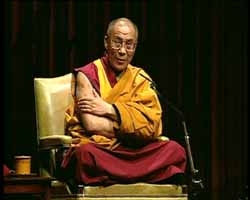
In 1996 he received, together with Anne, Chenrezig empowerment from the Dalai Lama in London, in 1997 he started the Advayavada Buddhism Information Center on the Internet, and in 1998 the Advayavada Network. The purpose of Advayavada Buddhism is to help us to become a true part of the whole - the Noble Eightfold Path is interpreted dynamically as an autonomous and creative process of progressive insight, reflecting in human terms wondrous overall existence ever becoming over time in its manifest direction. He is regularly invited to give talks on these subjects and he has developed a helpful study plan. Training courses he attended in the early days were those by Stephen Batchelor and Maura Sills at Schumacher College, Devon, in November 1998, and by David and Caroline Brazier, organized in Amsterdam by the Amida Trust, in June and October 1999. In October 1999 he also attended the Dalai Lama's Mitrugpa initiation ceremony and Ethics in the Next Millennium lecture in The Hague.
In February 2000 he travelled to Sri Lanka and he is very grateful to the Ven. Olande Ananda, of the Pagoda Meditation Centre, at Nugegoda, for his invaluable assistance throughout the visit. In Sri Lanka he met with several senior Theravada monks, visited the Polgasduwa Island Hermitage, and observed firsthand the effects of this form of Buddhism on the socio-political climate of that country: it is well-known that Theravada Buddhism places great emphasis on the clergy (sangha) as the only ones capable of attaining Nirvana and that the laity trustingly support them in the hope of a more favourable  for
for
In April 2000 he attended Thich Nhat Hanh's The Path of Understanding and Love lecture and in October 2000 his Being Peace, A Way to Practice Manifesto 2000 lecture, both in The Hague. In July 2001 he was pleased to attend, in Amsterdam, a refreshingly disturbing talk by Sulak Sivaraksa on 'Engaged Buddhism'.
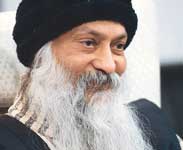
John Willemsens' favourite definition of the Truth is that by Shree Rajneesh, contained in a 1985 letter to him from Rajneeshpuram: "Beloved John, I talk about the truth as joy in the heart; it has nothing to do with logic, nothing to do with philosophy; it has something to do with a transformation of your innermost core, when your very being starts throbbing, pulsating, in tune with existence, when there is no discord between you and the whole, when you are so synchronized with the whole that you are no more but only the whole is." Also the purpose of Advayavada Buddhism is to help us to become a true part of the whole.
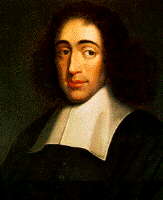
In Advayavada Buddhism we are very interested in the 'God sive
However, according to Spinoza in the final pages of his Ethics (EVP22ff), the one substance can allegedly retain or retrieve a something from the mind of a human being that no longer exists in time, meaning that, according to Spinoza, the human mind has a temporal and a non-temporal part, which is, of course, dualism plain and simple. Spinoza states moreover that this non-temporal something of the human mind, which is somehow to be retained or retrieved by the one eternal substance, can furthermore grow in size during the lifetime of the human being (EVP38 and 39), which is, of course, contradictory, because change is a temporal phenomenon.
We believe instead that sentient beings are the only part of the whole of reality which has become capable of knowledge, and what man and other sentient beings have in common with the rest of existence is not thought of any kind, but rather their conatus, the innate striving or drive to persevere successfully in being of all things, and of which sentient cognition is certainly an element. This conatus is, in Advayavada Buddhism, the 'fourth' sign or mark or basic fact or feature of wondrous overall existence, which is understood and experienced, from the human standpoint, as 'progress', and is similar to Te, the 'virtuous power' of the Tao in Taoism.
The Advayavada Foundation was established in 2001. John Willemsens represented the Advayavada Foundation at the 31st World Congress of the International Association for Religious Freedom IARF, which took place in Budapest (Hungary) from July 28th to August 2nd, 2002. The Foundation bestowed the title of Venerable on John Willemsens on his 70th birthday in 2004. Also in 2004, he attended the Fourth Parliament of the World's Religions, in Barcelona (Spain) from July 7th to 13th, 2004.
Besides carrying out its official main purpose of advancing Advayavada Buddhism in the world, the Advayavada Foundation seeks to further the implementation of the following universal Common Ground negotiation formula: In the case of tension and the threat of conflict, to immediately lower our concern and attention to the level of the values we already share and to restart the negotiations from that point onwards as often as necessary. All the Foundation's initiatives are based further on the general principles of 1) the secular state; 2) a multicultural society; 3) liberal democratic governance; 4) the Universal Declaration of Human Rights; 5) gender equality and education for all; 6) fair trading and sharing; 7) non-violence and peace; 8) Common Ground conflict resolution*; 9) the care for health and environment; and 10) international cooperation and solidarity.
* "First our common ground, then our religion or belief."
 According to Spinoza,
According to Spinoza,
God or Nature is a dynamic whole which he calls substance.
Nature has things which he collectively calls extension.
You and I are particular modes of extension.
Things exist in different ways which he collectively calls thought.
Modes of thought mirror modes of extension one-to-one.
Thought and extension are two aspects of the same things.
They are the two known attributes of the one substance.
 Those who seek to distinguish themselves from Creation are the carriers of
original sin = Those who seek to distinguish themselves from wondrous overall existence do not understand the Teaching. (John Willemsens)
Those who seek to distinguish themselves from Creation are the carriers of
original sin = Those who seek to distinguish themselves from wondrous overall existence do not understand the Teaching. (John Willemsens)
 Belief, faith, is just somebody's opinion. (Harry Kuitert, Dutch maverick
theologian, in Trouw newspaper)
Belief, faith, is just somebody's opinion. (Harry Kuitert, Dutch maverick
theologian, in Trouw newspaper)
 [In all my artistic work] the Dharma is my raw material. (Stephen Batchelor, at a symposium in Amsterdam)
[In all my artistic work] the Dharma is my raw material. (Stephen Batchelor, at a symposium in Amsterdam)
 Human concepts, no matter how cleverly conceived they are, almost always work against the Whole. (Christopher Alexander, in Tricycle)
Human concepts, no matter how cleverly conceived they are, almost always work against the Whole. (Christopher Alexander, in Tricycle)
 From the Western point of view, it is impossible to understand that fate, destiny and free-will can co-exist. Everything in the Western mind says that, if there is fate, there isn't free-will, if there is free-will, there can't be such a thing as fate or destiny. The Mahabharata sails quietly through that, cuts that away, and puts one in front of something very, very different, which is that freedom exists in a quite different way, and one sees that the great freedom for each character is, either to become himself, or not to become himself. (Peter Brook, director, about the Mahabharata)
From the Western point of view, it is impossible to understand that fate, destiny and free-will can co-exist. Everything in the Western mind says that, if there is fate, there isn't free-will, if there is free-will, there can't be such a thing as fate or destiny. The Mahabharata sails quietly through that, cuts that away, and puts one in front of something very, very different, which is that freedom exists in a quite different way, and one sees that the great freedom for each character is, either to become himself, or not to become himself. (Peter Brook, director, about the Mahabharata)
 I think that all those who feel so inclined should study the old languages and texts of Buddhism, even take ordination and rise in the hierarchy, but never let down their guard against the illusion of security. There is nothing to hang on to. The path emerges from a personal, surprisingly innate sense of direction and not from what's expected of us by those who supposedly know better. Staying awake means continually reevaluating the ground on which we walk. Buddha wasn't trying to be humble when he told us to think for ourselves; it's the very essence of his teaching. (Stephen Schettini, in Tricycle)
I think that all those who feel so inclined should study the old languages and texts of Buddhism, even take ordination and rise in the hierarchy, but never let down their guard against the illusion of security. There is nothing to hang on to. The path emerges from a personal, surprisingly innate sense of direction and not from what's expected of us by those who supposedly know better. Staying awake means continually reevaluating the ground on which we walk. Buddha wasn't trying to be humble when he told us to think for ourselves; it's the very essence of his teaching. (Stephen Schettini, in Tricycle)
 In other words, the reality that is revealed to us by pure experience, prior to the activity of our intellect or reason, should be our guide to moral conduct. In order to understand it, we must experience it by moving beyond our attachments to subjectivity and reason. (Christopher S. Jones, on Early Nishida, in Philosophy East and West)
In other words, the reality that is revealed to us by pure experience, prior to the activity of our intellect or reason, should be our guide to moral conduct. In order to understand it, we must experience it by moving beyond our attachments to subjectivity and reason. (Christopher S. Jones, on Early Nishida, in Philosophy East and West)

 It is very difficult to pursue a spiritual path when your awareness of the
world around you is blocked or distorted by your preoccupation with your own inner conflicts. (from a posting on a Yahoo list)
It is very difficult to pursue a spiritual path when your awareness of the
world around you is blocked or distorted by your preoccupation with your own inner conflicts. (from a posting on a Yahoo list)
 Good and kind people outnumber all others by thousands to one. The tragedy of history lies in the enormous potential for destruction in rare acts of evil, not in the high frequency of evil people. (Prof. Stephen Jay Gould, in a letter to The New York Times, about the 9/11 atrocities)
Good and kind people outnumber all others by thousands to one. The tragedy of history lies in the enormous potential for destruction in rare acts of evil, not in the high frequency of evil people. (Prof. Stephen Jay Gould, in a letter to The New York Times, about the 9/11 atrocities)
 Below some pictures taken at the opening of the new Fo Guang Shan He Hwa Buddhist temple in Amsterdam in September 2000: 1) Queen Beatrix and former Mayor Schelto Patijn going to their seats for the festivities following the official inauguration ceremony; 2) from left to right Ven. Obadaelle Rahula Maha Thera, Ven. Dr. Kalallelle Sekhera Maha Thera, Rev. Thich Minh Giac of the Pagoda Van Hanh, Ven. Olande Ananda Maha Thera, John Willemsens a.k.a. Advayavadananda, and Vipassana teacher Jotika Hermsen; 3) Ven. Dr. Sekhera covers his head against the Autumn sun; 4) also Ven. Ananda protects himself from the sun; 5) Anne Willemsens and Jotika Hermsen are good friends.
Below some pictures taken at the opening of the new Fo Guang Shan He Hwa Buddhist temple in Amsterdam in September 2000: 1) Queen Beatrix and former Mayor Schelto Patijn going to their seats for the festivities following the official inauguration ceremony; 2) from left to right Ven. Obadaelle Rahula Maha Thera, Ven. Dr. Kalallelle Sekhera Maha Thera, Rev. Thich Minh Giac of the Pagoda Van Hanh, Ven. Olande Ananda Maha Thera, John Willemsens a.k.a. Advayavadananda, and Vipassana teacher Jotika Hermsen; 3) Ven. Dr. Sekhera covers his head against the Autumn sun; 4) also Ven. Ananda protects himself from the sun; 5) Anne Willemsens and Jotika Hermsen are good friends.
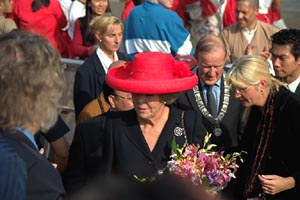
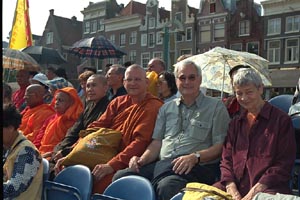
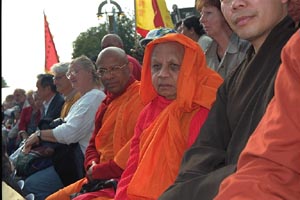
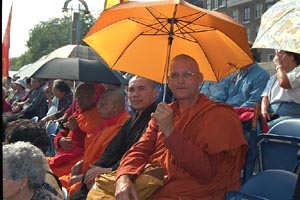
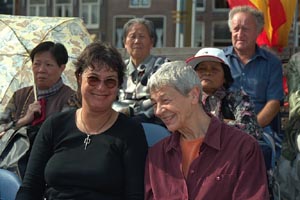
 The common error of ordinary religious practice is to mistake the symbol for the reality, to look at the finger pointing the way and then to suck it for comfort rather than follow it. (Alan W. Watts, in The Wisdom of Insecurity)
The common error of ordinary religious practice is to mistake the symbol for the reality, to look at the finger pointing the way and then to suck it for comfort rather than follow it. (Alan W. Watts, in The Wisdom of Insecurity)
 Few among men are they who cross over to the further shore. The others merely run up and down the bank on this side. (Dhammapada, verse 85)
Few among men are they who cross over to the further shore. The others merely run up and down the bank on this side. (Dhammapada, verse 85)
 At present humanity simply lacks the qualities necessary to govern itself and the world properly. (John Willemsens)
At present humanity simply lacks the qualities necessary to govern itself and the world properly. (John Willemsens)
 A human being is a part of the whole called by us universe, a part limited in time and space. He experiences himself, his thoughts and feelings as something separated from the rest, a kind of optical delusion of his consciousness. This delusion is a kind of prison for us, restricting us to our personal desires and to affection for a few persons nearest to us. Our task must be to free ourselves from this prison by widening our circle of compassion to enhance all living creatures and the whole of nature in its beauty. (Albert Einstein)
A human being is a part of the whole called by us universe, a part limited in time and space. He experiences himself, his thoughts and feelings as something separated from the rest, a kind of optical delusion of his consciousness. This delusion is a kind of prison for us, restricting us to our personal desires and to affection for a few persons nearest to us. Our task must be to free ourselves from this prison by widening our circle of compassion to enhance all living creatures and the whole of nature in its beauty. (Albert Einstein)
 Truly holy deeds are only those which are in agreement with wondrous overall existence and take us forward at the fundamental level of existence. (from the Q&A section of this website)
Truly holy deeds are only those which are in agreement with wondrous overall existence and take us forward at the fundamental level of existence. (from the Q&A section of this website)
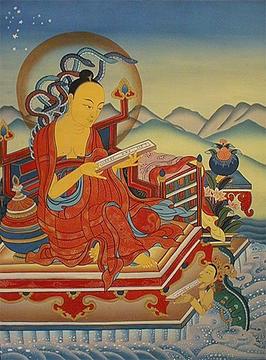
 The Madhyamaka.. is above all a soteriological philosophy. It is intended to produce an existential transformation in the individual. Philosophy, therefore, for the Madhyamika is more than simply an intellectual exercise. On the contrary, philosophy supplies a means of achieving an actual transition from a condition of ignorance and bondage to one of knowledge and freedom. It is the critical awareness of the subjective origin of the universe of appearance which enables one to remove the subjective illusion which obscures the actual nature of the ultimately real. (from Madhyamaka Schools in India, by Peter Della Santina, 1986, Delhi 1995)
The Madhyamaka.. is above all a soteriological philosophy. It is intended to produce an existential transformation in the individual. Philosophy, therefore, for the Madhyamika is more than simply an intellectual exercise. On the contrary, philosophy supplies a means of achieving an actual transition from a condition of ignorance and bondage to one of knowledge and freedom. It is the critical awareness of the subjective origin of the universe of appearance which enables one to remove the subjective illusion which obscures the actual nature of the ultimately real. (from Madhyamaka Schools in India, by Peter Della Santina, 1986, Delhi 1995)


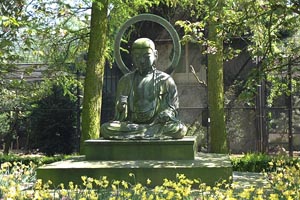
 In Nederland: Gelieve uw vrijwillige bijdrage te storten op rekening NL83ABNA0814472079 t.n.v. de Advayavada Stichting, te Amsterdam. Elk bedrag is welkom. Hartelijk dank!
In Nederland: Gelieve uw vrijwillige bijdrage te storten op rekening NL83ABNA0814472079 t.n.v. de Advayavada Stichting, te Amsterdam. Elk bedrag is welkom. Hartelijk dank!
 From abroad: Please instruct your bank to transfer your donation to the Advayavada Stichting, account NL83ABNA0814472079 at the ABN-AMRO Bank, Singel 548, 1017 AZ Amsterdam (BIC: ABNANL2A). All amounts welcome. Thank you very much!
From abroad: Please instruct your bank to transfer your donation to the Advayavada Stichting, account NL83ABNA0814472079 at the ABN-AMRO Bank, Singel 548, 1017 AZ Amsterdam (BIC: ABNANL2A). All amounts welcome. Thank you very much!
(last modified 15 January 2021)
| search engine by freefind |